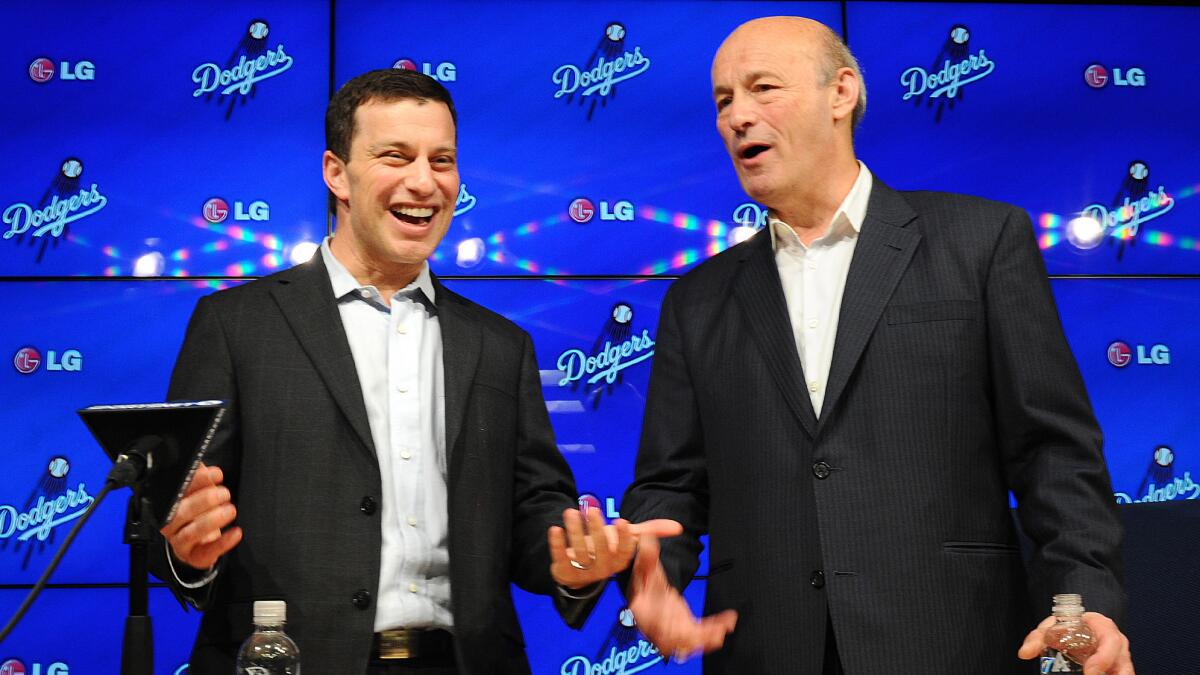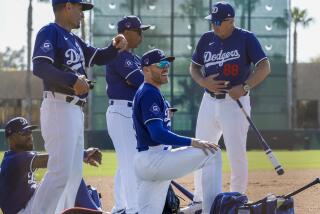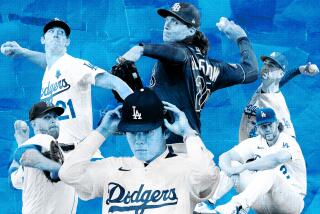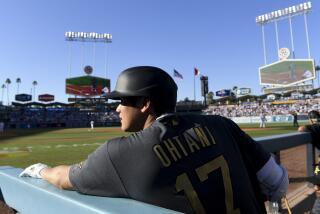Dodgers looking at long-term as well as this season

The home team has not won a World Series in a generation, or even appeared in one. The team is playing to win, in a major market, with major resources.
The home team got the best pitcher traded this month, and the best position player too.
This is something big to celebrate ... if you call Canada home.
The Toronto Blue Jays, 22 years removed from their last World Series, boldly grabbed David Price and Troy Tulowitzki.
The Dodgers, 27 years removed from their last World Series, passed on both, and on Johnny Cueto, and on Cole Hamels. Never has the divide been greater between the analytical segment of the fan base and the devoted followers tired of waiting for next year while championship parades occupy the streets of Anaheim, Miami and San Francisco.
Especially San Francisco. Three times in five years, and the Giants are breathing fire again this year.
The Dodgers did not rest at the trade deadline. They needed two starters, and Mat Latos and Alex Wood are pretty good, certainly better than what the Dodgers had. They got two relievers to fortify a weary and inexperienced bullpen too, and a top prospect who could be their second baseman next year.
None of those players is named Price, Hamels or Cueto.
Andrew Friedman, the Dodgers’ president of baseball operations, insists he gets it. He has not even been here a year, and he understands that we are anguished and aggravated that we must satisfy our yearning for October glory with a grainy video clip of Kirk Gibson.
“I have a tremendous amount of respect for the passion our fans have for our team,” Friedman said Thursday, “and we all share the exact same goal, which is to win the World Series. Everything we’ve done since the middle of October has been with that goal in mind.
“But it’s also not about winning just in 2015. It’s about creating something we can sustain for many years and hopefully have a number of championship banners up. That’s the goal, and we’re perfectly aligned in that, and everything we’re doing is working toward that.”
If you believe the Dodgers should have gotten a third ace at any Price, then Friedman’s comments amount to so much yada, yada, yada.
But here’s the thing: He’s right.
The Blue Jays are motivated by an urgency the Dodgers do not share. The Jays have not even returned to the playoffs since Joe Carter; their 22-year postseason drought is baseball’s longest. They sold four million tickets that year — and the two years before that — but attendance has fallen by half since then.
Toronto is a fantastic city, but luring free agents to Canada can be problematic. Russell Martin signed as a free agent — he’s Canadian — but Jose Bautista, Josh Donaldson, Mark Buehrle, R.A. Dickey, and Devon Travis all came in trades. So did Jose Reyes, just traded for Tulowitzki, and Price.
The Jays (52-51) are two games out of a wild-card spot, six games out of first place in the American League East, so they are mortgaging at least part of their future for what most likely would be a chance to advance to a sudden-death playoff game.
The Jays surrendered their best prospect in the package for Price. The Dodgers have made clear for two years now that their best prospects, shortstop Corey Seager and pitcher Julio Urias, would not be traded.
That was club policy even before Friedman arrived. Once he did, he and colleagues Farhan Zaidi and Josh Byrnes have leveraged the Dodgers’ overwhelming financial resources to dominate Latin America, swallow the bad contracts of bad players on other teams to get good players and extra draft picks, and subsidize the operation of the Miami Marlins.
To be sure, the Dodgers could have traded for Price without gutting their minor league system. But every asset saved today is an asset that might help tomorrow.
The Dodgers are terrified of turning into the New York Yankees of the last few years, a paper tiger with too many old guys getting too much money, and a minor league pipeline that had dried up. Free-agent dependency became a self-fulfilling prophecy, and not a winning one.
For all the Dodgers did Thursday — a three-way trade in which they landed seven players and absorbed more than $40 million — they lost one prospect.
His name is Hector Olivera. He is 30. He plays third base.
Justin Turner is 30. He plays third base too, and pretty darn well.
The kid to watch is Urias, the 18-year-old prodigy. If he does not develop the way the Dodgers trust he will, they might kick themselves for not trading him for Price last year, or this year.
They would have had a better chance to win this year with Price, particularly in a postseason rotation with Clayton Kershaw and Zack Greinke, but a formidable rotation is no guarantee of October success.
In 2011, the Philadelphia Phillies had what was regarded as perhaps the most menacing rotation in recent history, with Roy Halladay, Cliff Lee, Cole Hamels and Roy Oswalt.
The Phillies led the league with 102 victories, but they lost to the St. Louis Cardinals in the division series.
Make no mistake: The Dodgers are all in, in their own long-lasting way.
bill.shaikin@latimes.com
Twitter: @BillShaikin
MORE DODGERS NEWS:
Dodgers stack their cart ahead of deadline, must put some players aside
Dodgers bolster starting pitching depth with 3-team, 13-player trade
Blue Jays, not Dodgers, get pitcher David Price
More to Read
Are you a true-blue fan?
Get our Dodgers Dugout newsletter for insights, news and much more.
You may occasionally receive promotional content from the Los Angeles Times.







